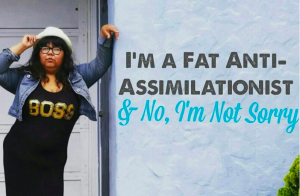My metamour (aka the partner of my partner with whom I don’t have a romantic relationship) has the best coming-out-polyamorous story.
Our shared partner and I were on a date to celebrate six months of dating; she and her family were out for brunch. They were stopped at a stop sign, when my partner and I obliviously crossed the street right in front of them.
Inside the car, my metamour’s mom said, “Isn’t that [Partner]? Who’s that holding his hand?”
My metamour burst out into only-slightly-hysterical laughter, gave them the one-sentence definition of polyamory, and then said she didn’t want to talk about it any more right then. Later that day, she sent them an e-mail explaining polyamory in more detail, telling them her own history, and telling them who I was.
Coming out to your family as polyamorous can happen many different ways. Hopefully you’ll have more time to plan and prepare than my metamour did, but it’s important to remember that you get to decide if, when, and how.
One difference between coming out as polyamorous and coming out as queer is that families are less likely to be familiar with what that means, for them and for you. That means they may have a lot of questions.
Be prepared to do some explaining, defining, and answering. Coming out to family is (in most cases) one of those times where it’s worth gritting your teeth and responding kindly to those comments and questions we’re all tired of.
No two families will respond the same way, and your family’s specific concerns will be influenced by their own cultural, political, and religious backgrounds. In this piece, I’ve tried to be broad and inclusive, but I recognize that I come from a middle-class white American background, so I’m sure I’m missing questions that will be important in some families.
That said, here are some things that often come up when families are first learning about polyamory. Thinking through how you’d respond to each of these may help you prepare for the conversation.
1. ‘Aren’t You Being Exploited? / Aren’t You Exploiting Your Partner?’
People often assume that a polyamorous person is taking advantage of their partners, using it as an “excuse” to sleep around or avoid commitment.
Thanks to binary gender stereotypes, women and people who don’t currently have more than one partner tend to hear, “Why are you letting your partner do that? You’re being exploited!” Men and people who do currently have multiple partners more often hear “Aren’t you taking advantage of your partners? Why can’t you commit to anyone?”
It would be nice if people would take “Nope, we’re all happy, thanks!” for an answer, but often, they need more convincing than that.
It’s helpful if you can bring up concrete examples of positive things that polyamory brings, like times your extended polyamorous family supported you, or how awesome it is to talk with your metamour about that TV show you both love, but your shared partner hates.
Ultimately, though, time may work better than arguments here.
My former mother-in-law had always said that any woman her son dated must have low self-esteem or she’d never agree to be polyamorous. After a couple years of getting to know me, she could see that it wasn’t true of me, and she changed her assessment.
2. ‘Isn’t This Immoral and Wrong?’
Some people have a knee-jerk reaction to polyamory as “wrong” because it violates what they’ve always thought of as a core ethic of relationships: that you are sexually faithful to your partner.
It can help to talk about the different ethics that are important in your relationships. What does it mean to you to be responsible and caring toward your partners?
They may not get it at first, but hearing that you have some sense of ethics and responsibility – and watching you live them out over time – counters the narrative that sexual exclusivity is the only way to be a good partner.
For some families, moral objections come from a place of firm religious conviction about what relationships should look like. This is much harder to combat, as there may be no arguments and no passage of time that will shake those beliefs.
If you share your family’s core belief system, you may decide it’s worth having conversations with them about why you feel your polyamory doesn’t conflict with your beliefs.
It’s also okay to decide that conversations like this are too harmful to you, and you need to take the subject of religious morality off the table.
3. ‘But What About Our Grandchildren?’
Whether you have children or not, your parents are often going to be concerned about how polyamory will affect their grandchildren.
We don’t have a lot of studies yet, but what we do have says that a polyamorous family can be just as healthy for kids as a monogamous one.
Even if you’re not planning to have kids, or aren’t sure, you can trot out these studies and link them to a few personal accounts of being raised by polyamorous parents to ease their worries.
One thing to stress, if your family is making squicked-out noises about children being exposed to a “sexually deviant” lifestyle, is that kids are pretty oblivious to the sexual goings-on.
Responsible polyamorous parents don’t expose their kids to the sexy side of their relationships, any more than responsible monogamous parents do.
What the children see is that there are lots of adults around who love and care for them and for each other.
4. ‘Do We Have to Meet Your Other Partners?’
Planning how to introduce multiple partners to your family can be tricky, especially if they’re very resistant to the whole idea. This is especially true if they’ve already met one of your partners, on the assumption that you were monogamous.
With holidays approaching, it’s tempting to want to push your family quickly to a place where you can bring all your partners to the big family gathering. In some families, this might work, but many will need more time to adjust to the idea.
It’s a good idea to start smaller.
Lunch or dinner at your place, or meeting up at a restaurant, is lower-stakes and may make it easier for your family to get to know your partners.
5. ‘Is This Just About Sex and Perversion?’
You’re probably already aware that many people hear polyamory and think, “ORGIES!” We have to tell people over and over: “It’s not (all) about the sex.”
Unless your family is unusually open with each other about each other’s sex lives, though, this is one you can shut down with “Mom, our sex life is private, and I’m sure you don’t really want to hear about it.”
You can set the boundary here and defend it as much as you need to.
“Do you ask [monogamous sibling] about their sex life? Then why would you ask about mine?” “How about, instead of imagining us all having sex together, you imagine us all talking about who’s doing which household chores this week? Because believe me, that happens a lot.”
6. ‘When Will You Grow Out of It?’
Ah, every queer person’s favorite phrase!
As with many identities and choices that don’t follow the path your family expected of you, they often comfort themselves – and dismiss you – by asserting that it’s just a phase.
“You’ll grow out of it” is infuriating because it takes a deeply personal thing you’ve revealed to them and turns it into just another sign of “immaturity.” It’s also not something you can actually argue against.
Neither of you knows the future, so there’s no way this conversation can go but “No I won’t!” / “Yes you will!” until someone gets bored.
Instead of having the pointless future argument, it’s productive to focus on two things that are in the present: how you each feel, and how your family is going to act.
Often, “you’ll grow out of it” stems from a fear of losing the future they’d dreamed of for you. By telling themselves that it’s just a phase, they don’t have to process any grief and loss they feel about your future.
Families often don’t realize how their attempt to protect their own feelings is incredibly invalidating to you. If you feel safe addressing feelings like this with them, calling out that dynamic can be a powerful way to move forward.
“It sounds like you’re not ready to let go of the idea of me being in a relationship that you think of as ‘normal,’ but when you say that, I feel like you’re just dismissing me after I’ve shared something very vulnerable with you.”
If that’s not the kind of conversation you can have with your family, you can go with a more action-oriented approach: “Maybe, maybe not. But for right now, Alex and Harper are really important people in my life, and I’d like you to meet both of them.”
7. ‘How Will I Explain This to [Extended Family, Co-Workers, Whoever Else]?’
The surface question here is easy to answer: “Well, you can say everything I just told you: It’s a loving and open relationship involving more than two people.” But what’s underneath is often concern about being judged by others for your lifestyle choices. It also may be that they’re using “what others will say” as a way to express their own discomfort without saying so directly.
Boundaries are good here. It’s not your job to tell them how to navigate their other relationships.
The best approach here is to give them resources for learning about polyamory, and then let them decide how much and how to explain things to other people in their lives.
***
You’re the expert on your family – even if it doesn’t always feel like it! You know what kinds of conversations tend to go well with them, and what kind tend to go badly.
You also know, better than anybody else, why polyamory is the right choice for you, why it’s something to celebrate instead of something to apologize for, and how it’s benefitted you and your relationships.
Your family may not get it right away, and that’s okay.
Explaining polyamory to family is often more of an ongoing process than a one-time conversation. The important thing is that you’re able to keep an open exchange going, and show them all the joy your loves bring to your life.
[do_widget id=’text-101′]
Ginny Brown is a Contributing Writer for Everyday Feminism, as well as a speaker and educator specializing in sexuality and relationships. She writes for various publications and has her own blog here. She lives in the Philadelphia area with her poly family and three cats. Follow her on Twitter @lirelyn.
Search our 3000+ articles!
Read our articles about:
Our online racial justice training
Used by hundreds of universities, non-profits, and businesses.
Click to learn more





















